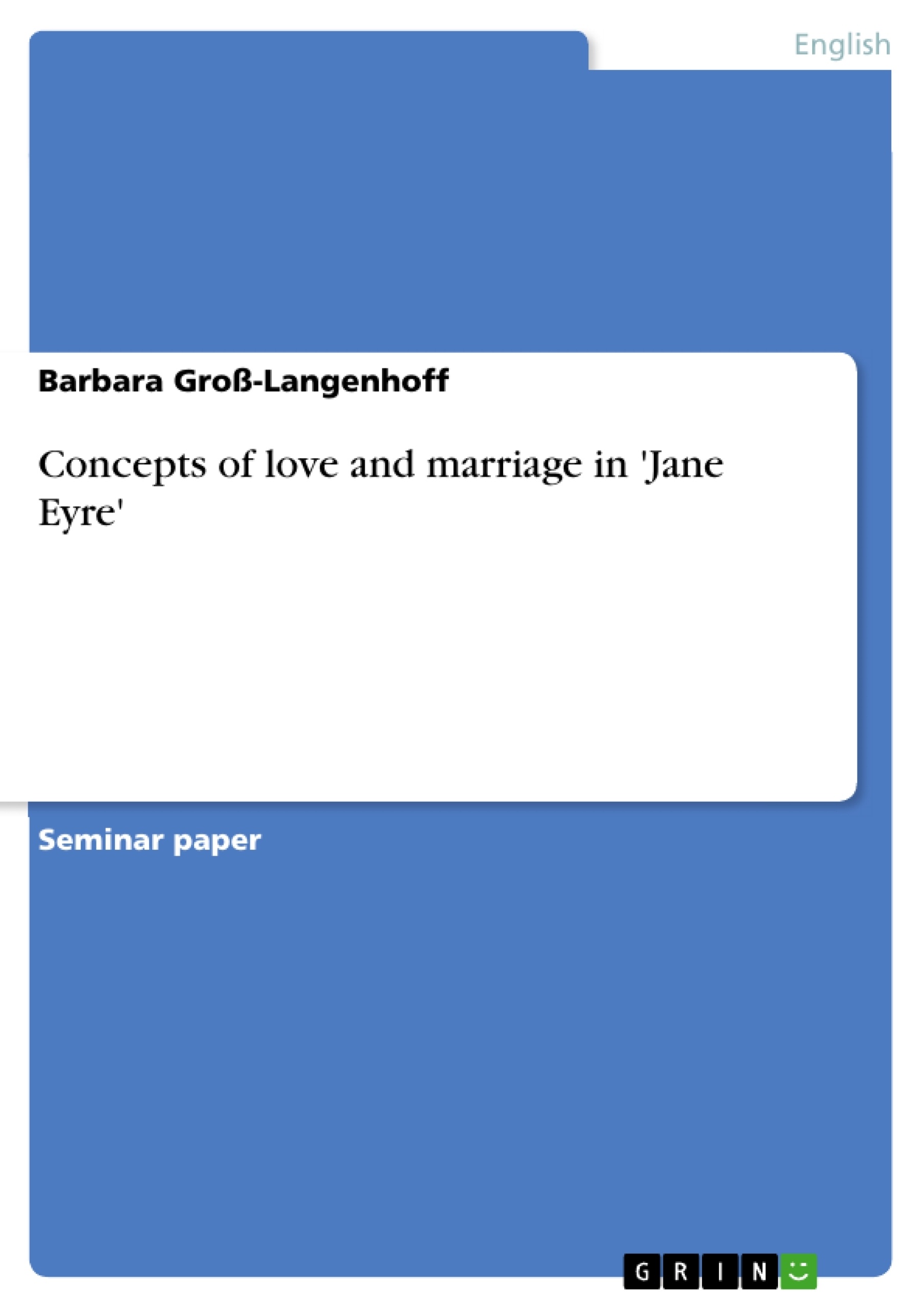In the novel Jane Eyre, which was first published in 1847, Charlotte Brontë discusses various problems concerning marriage, which especially affect the woman and she unfolds her idealistic picture of marriage. This work will concentrate on Jane Eyre´s conflicting relationships with the two male protagonists, which raise important issues of the marriage debate such as the double standard of morality, divorce and the rights of the married woman. The solution to the conflicts and the basis of a harmonious male-female relationship which are offered in the novel will be examined and subsequently evaluated.
But before I can embark on the study of concepts of love and marriage in Jane Eyre, it is useful to have some background information about the author and her time, which will make it easier to understand the problems discussed in the novel. Therefore, I am going to begin with a very brief outline of the situation women were in in the Victorian era and of Brontë´s attitude towards marriage.
Table of Contents
- I. Introduction
- I.1. The female role in the Victorian era
- I.2. Brontë's scepticism about Victorian marriage
- II. Concepts of love and marriage in Jane Eyre
- II.1. The unconventional position of Mr Rochester
- II.2. The divine mission of St John Rivers
- II.3. The conflict between passion and duty
- II.3.1. Jane Eyre's search for identity
- II.3.2. Jane's difficulties with Rochester
- II.3.3. Jane's power struggle with St John
- II.4. The solution to Jane's inner conflict
- III. Evaluation
- III.1. Brontë's new definition of male-female relationships
- III.2. The incompleteness of Brontë's concepts
Objectives and Key Themes
This work examines the complex themes of love and marriage within the Victorian era, as presented in Charlotte Brontë’s Jane Eyre. The focus lies on analyzing the conflicting relationships between Jane and the two male protagonists, Mr Rochester and St John Rivers, exploring the broader societal context of marriage and its implications for women. The study aims to analyze the author’s critique of the Victorian ideals of marriage and the double standard of morality, as well as the challenges faced by women in seeking autonomy and fulfilling relationships.
- The female role and its limitations in Victorian society
- Brontë's critique of the unequal power dynamics in marriage
- The conflict between passion and duty in romantic relationships
- Jane Eyre's search for self-identity and autonomy
- The author's vision for a more fulfilling and equitable marriage
Chapter Summaries
The introduction provides a brief overview of the Victorian era and the context surrounding women's roles, focusing on the legal and societal restrictions placed upon them. It highlights Brontë's critical perspective on the prevailing marriage model and her belief in the importance of female autonomy and independence.
Chapter II delves into the analysis of Jane's relationships with the two male protagonists, Mr Rochester and St John Rivers. It explores Mr Rochester's unconventional and flawed character, examining his desire for possession and control over Jane, despite his passionate feelings for her. The chapter contrasts this with the devout and rigid nature of St John Rivers, who embodies the concept of duty and self-sacrifice.
Furthermore, Chapter II examines the conflict between passion and duty, highlighting Jane's internal struggle for self-definition and her difficulties in navigating the expectations of society and her own desires. The chapter delves into Jane's power struggles with both men, emphasizing her desire for agency and equal partnership within a relationship.
Keywords
The primary focus of this work revolves around the themes of love, marriage, and female autonomy within the Victorian context. Key concepts include the double standard of morality, the rights of the married woman, and the conflict between passion and duty. The analysis examines the specific characters of Jane Eyre, Mr Rochester, and St John Rivers, along with Brontë's critique of the patriarchal structures of her time and her vision for a more fulfilling and equitable marriage.
- Quote paper
- Barbara Groß-Langenhoff (Author), 2000, Concepts of love and marriage in 'Jane Eyre', Munich, GRIN Verlag, https://www.grin.com/document/30494



